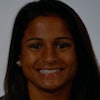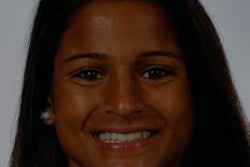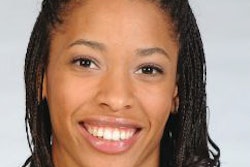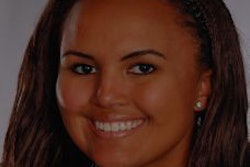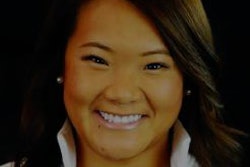Krystal Rivers always rises to meet a challenge, whether it’s on
the volleyball court, in the classroom or in her personal life.
In the last year, Rivers has maintained a 3.8 grade point average
and made history by becoming the first University of Alabama
women’s volleyball player to be named to the American Volleyball
Coaches Association Third Team All-America list.
She accomplished it all just months after undergoing treatment
for Hodgkin’s lymphoma.
Rivers admits she had some really bad days. But she pushed
herself, making — as she sees it — lemonade out of life’s lemons.
“I just had to get through it,” she told
The Tuscaloosa News last year.
And she wasn’t just undergoing
chemo treatments and taking classes.
“She did volleyball at the same time,”
Alabama setter Sierra Wilson told
The Tuscaloosa News.
As a Crimson Tide athlete, she has
racked up some impressive stats: 992
career kills; 10 double-doubles last year; three-time Southeastern
Conference (SEC) Offensive Player of the Week in 2013; 2014
preseason All-SEC volleyball team.
And that’s just a partial list. An academic junior who is a redshirt
sophomore, Rivers has more seasons ahead at Alabama.
Competitive by nature, she says she “came in without a lot of
confidence” after having played only a little volleyball and mainly
tennis in high school. Since switching to volleyball full time, her
love for the game has only grown.
Even still, “I struggle a lot,” she says, “and still have a lot of room
to grow” as she finds herself getting pushed more into leadership
roles on the team.
She’s “an incredible student-athlete,” says Alabama head
women’s volleyball coach Ed Allen. “She arrived here as [a]
walk-on player, not a scholarship [student], and has earned a
position as a scholarship athlete.”
Allen continues: “Her gift is her intelligence, her passion for the
game and the players. She has the ability to transfer information
faster than any [athlete] I’ve ever coached in 24 years as a head
coach.”
While Rivers excels on the hard court, she’s equally devoted to
maintaining the kinds of grades that will land her a spot in medical
school when she’s ready to apply.
Rivers, who grew up in Birmingham, has wanted to be a doctor
all of her life, she says.
“That’s the sole goal,” Rivers relates.
She takes a practical and efficient approach to attaining her goal
of going into the medical field of pathology. One example of that is
how she’s using her own battle with cancer, now in remission, to
learn about medicine.
Rivers has been shadowing her oncologist, Dr. David Hinton,
whom she met when she started chemo treatment, which ended in
July 2014.
“I love all kinds of science and am always looking to learn,” she
says.
Rivers also has a long love affair with reading. Her love of
reading comes from her mother, a housing counselor for the
Urban League who was always checking out books from the
library and taking her along. Rivers’ love of science caught on after
her aunt bought her an anatomy book for children. “It definitely
helps that I’ve been interested in science for so long,” Rivers says.
Nearing enough credits to complete her major in biology, Rivers
has started on the requirements for a second major, Spanish.
When she’s not on the court or hitting the books, Rivers finds
time to volunteer for campus organizations, including Habitat for
Humanity. She says having a great support system — her team,
coaches and family — keeps her grounded.
And what keeps her priorities in order? “I realize that I’m in
school for academics and volleyball. Those come first,” she says. “It
can be tough trying to manage my time, but [I] know what I’m
here for.”
Krystal Rivers
Apr 30, 2015
A New Track: Fostering Diversity and Equity in Athletics
American sport has always served as a platform for resistance and has been measured and critiqued by how it responds in critical moments of racial and social crises.
Read More
